

On the morning of March 21, the forum on Intellectual Property and High Quality Transformation of China's Economy was successfully held at Tongji University, hosted by the School of Economics and Management of Tongji University and the Shanghai International College of Intellectual Property, and organized by the Intellectual Property Laboratory of Tongji University and the MBA/EMBA Center of Tongji University. Prof. Dr. Lei Xinghui, Standing Committee Member of the Party Committee and Vice President of Tongji University, delivered an opening speech; Dr. Lv Wei, Deputy to the National People's Congress, Standing Committee Member of the National People's Congress and Researcher of the Development Research Center of the State Council; Prof. Dr. Mu Rongping, President of the China Society for Science and Technology Research, President of the China High Technology Industry Development Promotion Association and Researcher of the Institute of Science and Technology Strategy and Consulting of the Chinese Academy of Sciences; Mr. Han Xiucheng, Director of the Intellectual Property Development Research Center of the China National Intellectual Property Administration. Prof. Dr. Lv Guoqiang, former Director of Shanghai Intellectual Property Administration, Prof. Dr. Long Xiaoning, Professor and Doctoral Supervisor of Xiamen University and Distinguished Professor of Chang Jiang Scholars Program of the Ministry of Education, Prof. Shan Xiaoguang and Prof. Mao Hao, Dean of Shanghai International College of Intellectual Property of Tongji University, Prof. Chen Qiang of School of Economics and Management of Tongji University, and more than 200 teachers and students from online and offline participated in the forum. The forum was hosted by Prof. Zhong Ninghua from the School of Economics and Management of Tongji University and Prof. Xu Chunming from the Shanghai International College of Intellectual Property of Tongji University.
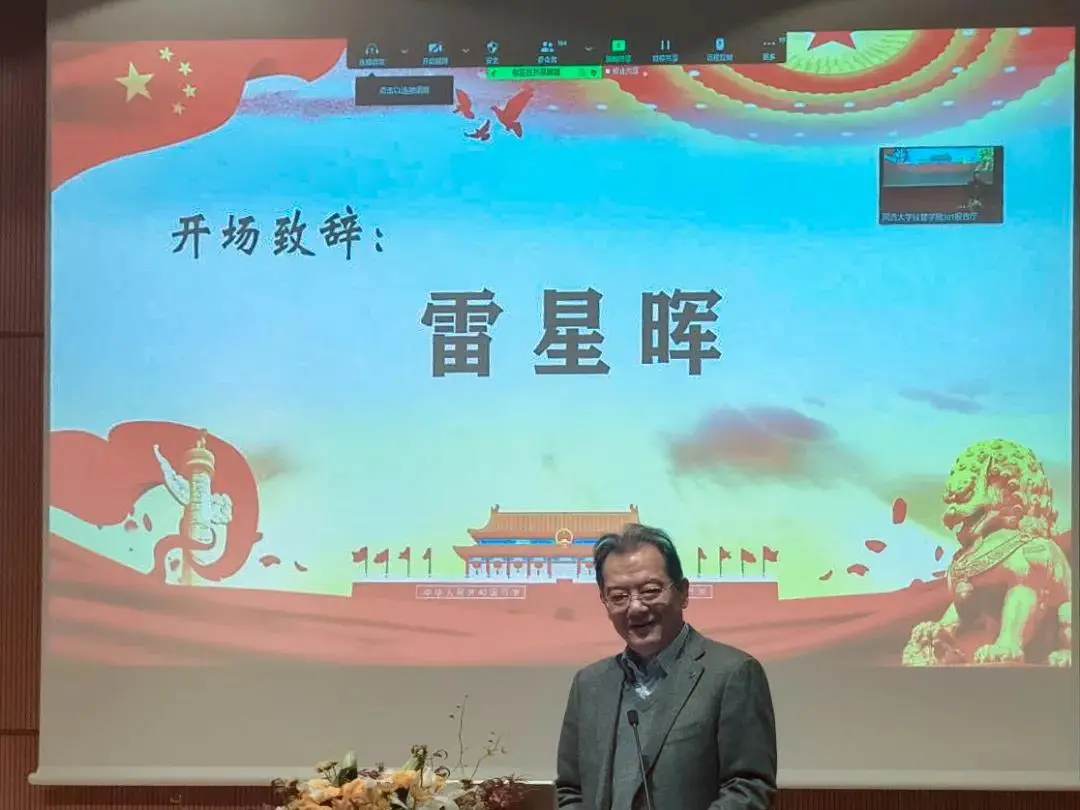
Mr. Lei Xinghui expressed his welcome to the participating experts on behalf of Tongji University and congratulated the success of the forum. He introduced the history of Tongji University's discipline development, praised the valuable attempt of the School of Economics and Management and the Shanghai International College of Intellectual Property to cooperate in organizing the forum, and explained the close connection between intellectual property and the high-quality transformation and development of China's economy, as well as the active exploration of Tongji University in this field. Mr. Lei Xinghui emphasized the importance of system arrangement of innovation incentives and core technology as the driving force of development, believing that core technology determines the construction of a country as a global technology center, and that only by becoming a technology center country can China become an economic center in the actual sense. IPR protection should be involved in the design of national system as an essential element to serve core technology R&D and the enhancement of comprehensive national power.
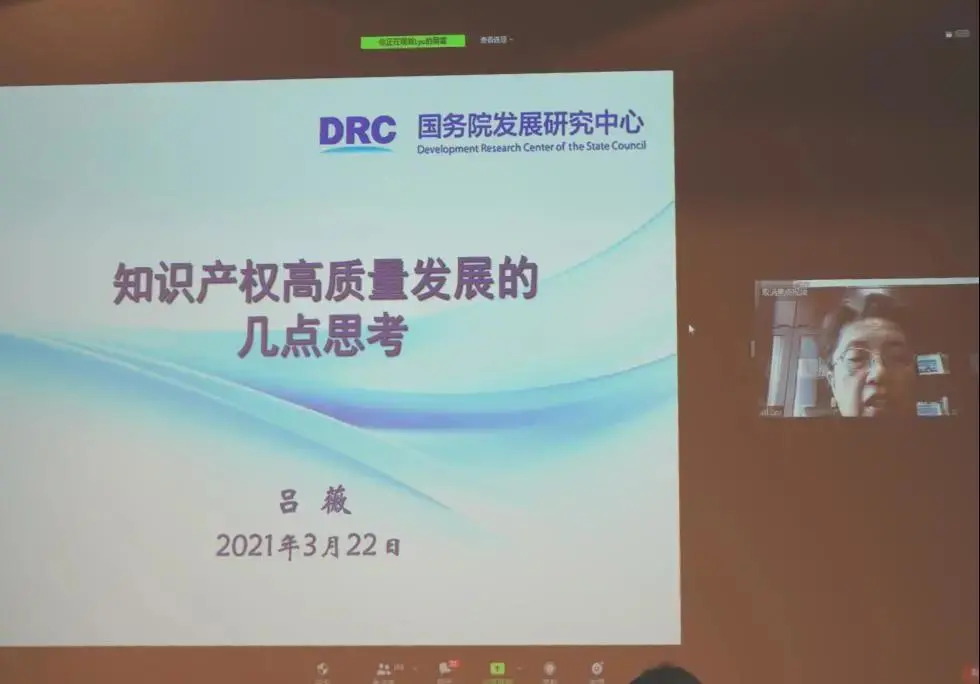
In the keynote speech session, Ms. Lv Wei shared online a few thoughts about the high-quality development of intellectual property. Under current intellectual property development situations such as the demand for original innovation capability within enterprises, the incongruity between the quantity and quality of registered intellectual property rights, the new trend of global intellectual property competition and rules, and the emergence of digital technology leading to online piracy and infringement, intellectual property protection has risen to the level of overall national strategy, which is in fact an important issue for national competitiveness and governance modernization. On the issue of how to promote the high-quality development of intellectual property, she believed that we should strengthen fundamental research, improve the ability of original innovation, break through the key technologies involving national security, ensure the security and stability of the industrial chain and supply chain, focus on the real economy, and promote the transformation and upgrading of industrial technology, so as to realize the combination of independent innovation and open innovation, and build a new development pattern of dual circulation in both international and domestic.
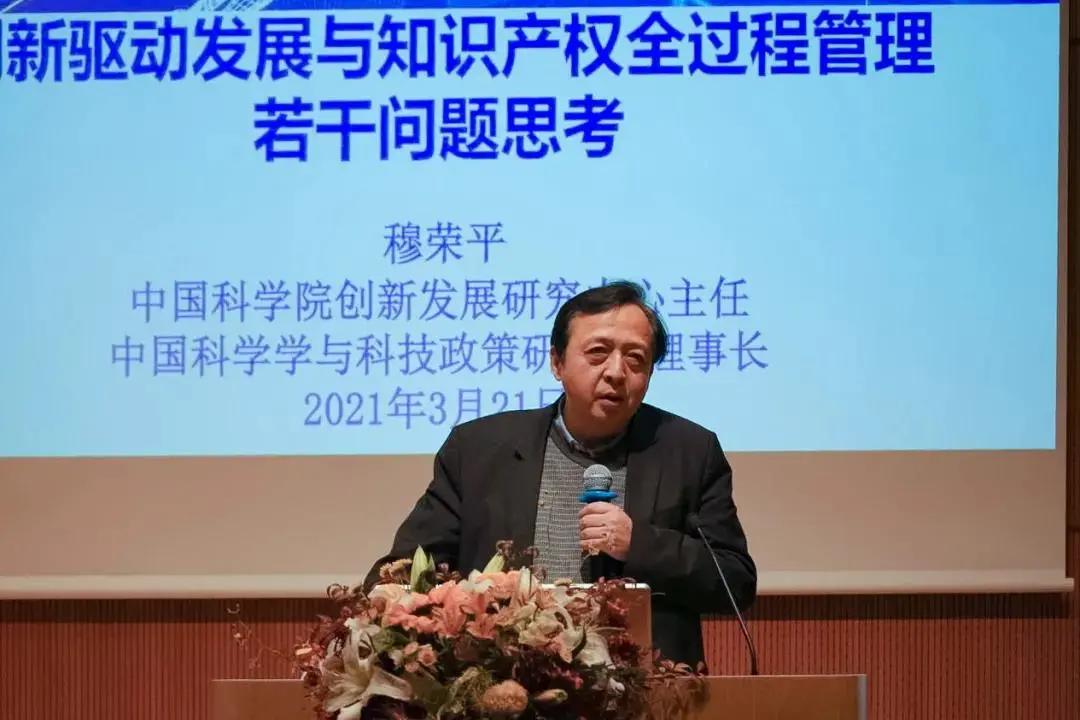
Mr. Mu Rongping comprehensively analyzed the combination mode from three aspects of innovation-driven development, intellectual property policy and intellectual property management, including how intellectual property policy can shape the competitive advantage and enhance the systemic innovation capability, and he also put forward constructive suggestions for the entire process of knowledge production in universities. He emphasized the key words central position and self-reliance and self-improvement in the communiqué of the Fifth Plenary Session of the 19th Central Committee of the Communist Party of China, and believed that technological innovation is crucial to the overall picture of modernization. He also put forward specific suggestions on deepening the reform of institutional mechanism, strengthening the construction of IPR protection environment, enhancing the quality of IPR examination, strengthening the capacity of patent operation service system and accelerating the training of IPR talents.
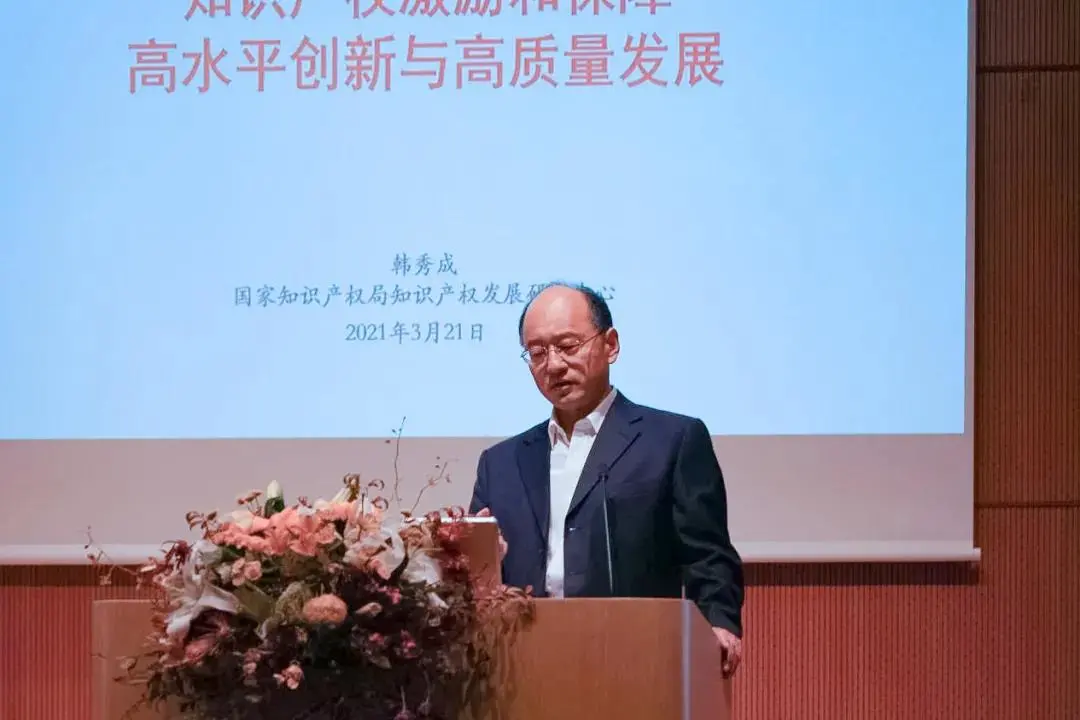
Mr. Han Xiucheng explained the topic of intellectual property rights to stimulate and guarantee high-quality innovation and development from three aspects. Firstly, IPR is the key to high-quality development, and only by strictly protecting IPR will it be possible to stimulate and guarantee high-quality development, build a new development pattern, and protect China's national security and economic security. Secondly, IPR protection is related to the construction of a new development pattern. The role and positioning of IPR in the new development pattern should be grasped, and the IPR strategy should be well applied in the new development pattern in which domestic and international dual cycles complement each other. Finally, IPR protection is related to national economic security, to which we should ensure that national security is autonomous and controllable, and we must pay attention to and strengthen the whole chain of IPR services and protection.
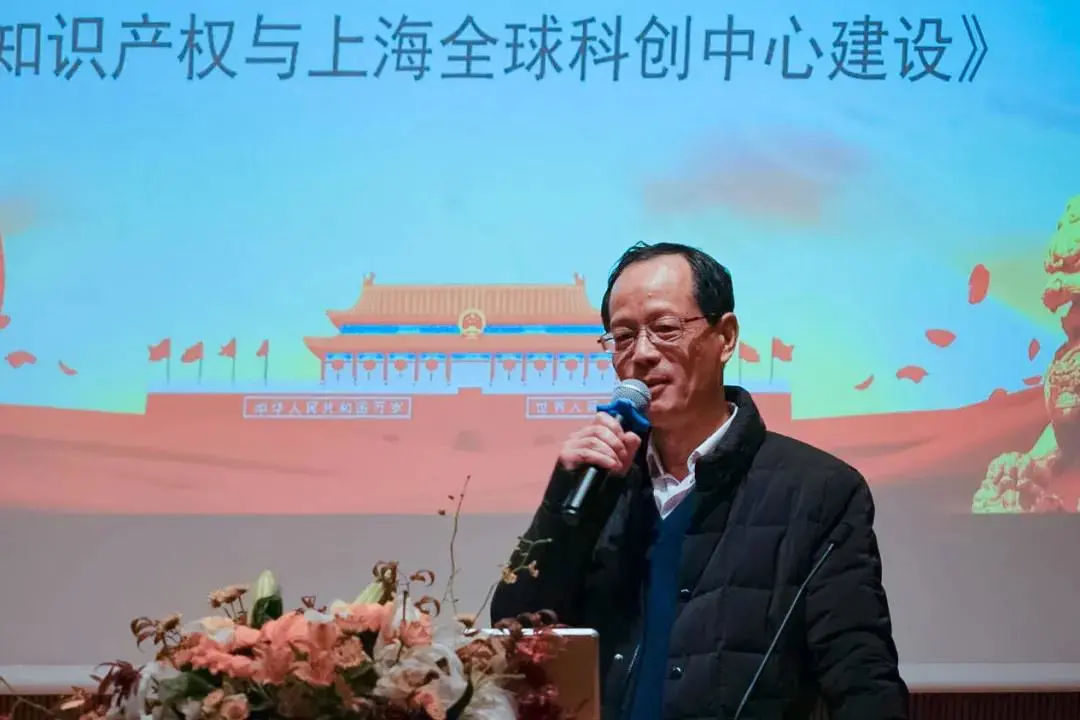
Mr. Lv Guoqiang shared his views on IPR and the construction of Shanghai Global Science and Technology Innovation Center. High-quality development is the theme of China's future economic and social development and is related to the overall situation of China's modernization. In recent years, Shanghai has made great progress in IPR reform, protection, talent training and international cooperation. The future development of Shanghai will focus on the high-level reform and opening up of Pudong, the construction of the new Lingang area in the Shanghai Free Trade Zone, the science and technology innovation board, the integrated development of the Yangtze River Delta, and the Shanghai import expo. Intellectual property should continue to play a supporting role for Shanghai's development, focusing on strengthening top-level design, improving the intellectual property protection system, strengthening the transformation and application, and strengthening international cooperation in intellectual property.
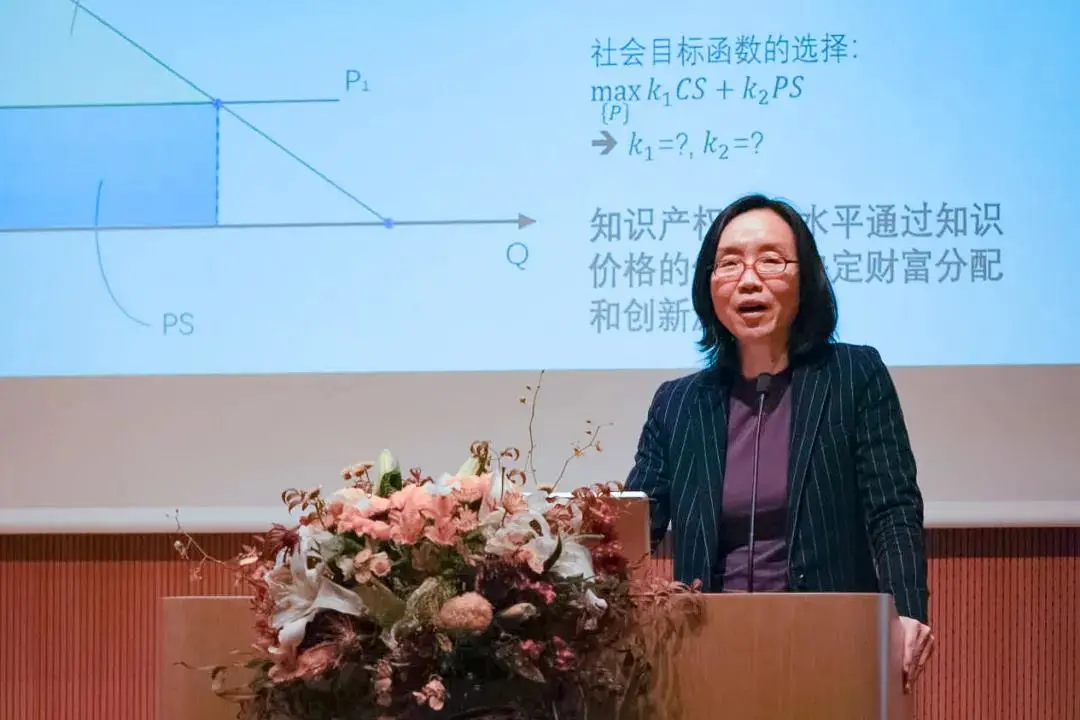
Ms. Long Xiaoning shared her economic interpretation of intellectual property with the topic of challenges and opportunities for the IP industry in high-quality development. She suggested that the intellectual property industry is comparable to the financial industry in terms of importance, and its new production-oriented service industry is often controversial because of its price characteristics. The construction of IPR system faces two challenges: one is to implement effective IPR protection and the other is to determine the optimal level of IPR protection. Long Xiaoning believes that the calculation of damages in judicial proceedings can determine the price of IPRs, while the construction of the rule of law in the infrastructure is also particularly important. Intellectual property protection is an important channel to promote the rule of law and optimize the rule of law environment, and the advantage of innovation is also the advantage of the rule of law environment.
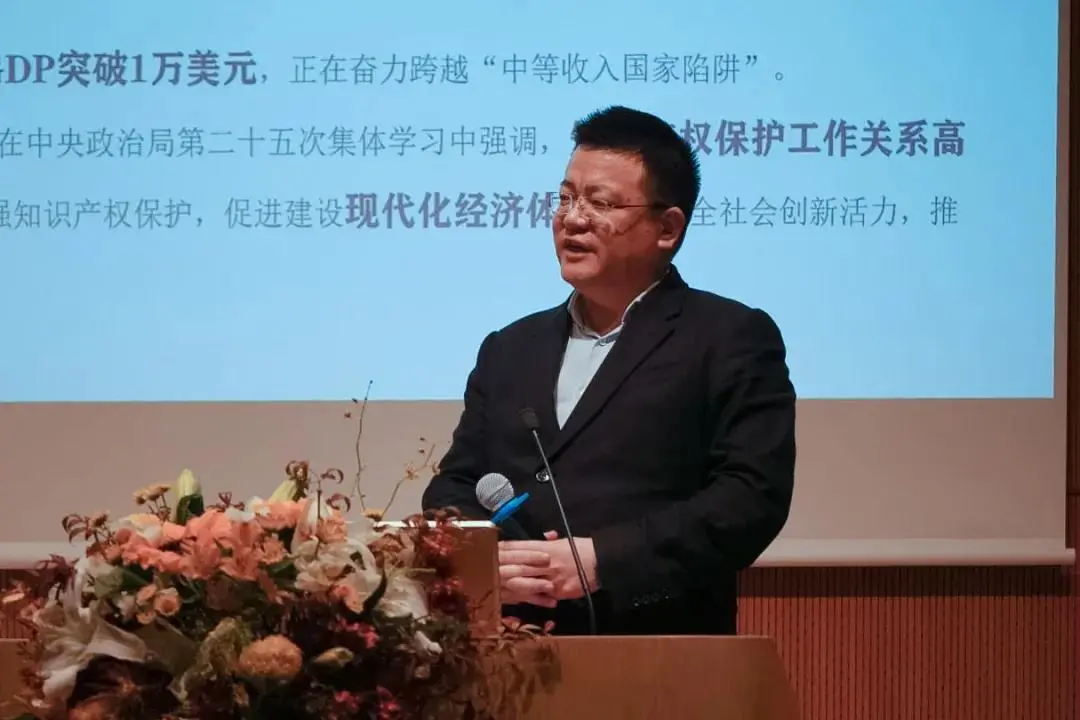
Mr. Mao Hao focused on the construction of world-class examination institutions, and discussed the transformation and development of China's examination institutions and challenges. He believes that in the stage of China's economy transforming to high-quality development, China's examination agencies should take the initiative to seek transformation: First, strengthen the basic function of patent system operation. Restore patent fee price leverage, strengthen patent damage compensation, realize low-quality patent filtering, enhance early secondary confirmation, weaken utility model use, and strengthen market financing functions. Second, optimize the patent examination process. The focus will be on shortening the examination cycle, improving the quality of examination and meeting diversified social needs by means of reform initiatives such as deep integration of the preliminary examination and substantive examination process. Third, reform the organizational structure of patent examination institutions. Establish interdisciplinary examination units that effectively respond to the development of new technologies, implement the reform of the examination process system of parallel pathways, and consider the setting of patent economist offices. Fourth, strengthen the effective support of national patent examination authorities for national economy and innovation development. Guide the macro management departments to establish scientific assessment and evaluation standards, establish an evaluation system oriented to quality and efficiency, structural space and growth matching, and realize the synergistic development of patent examination institutions and the national judicial and administrative governance system.
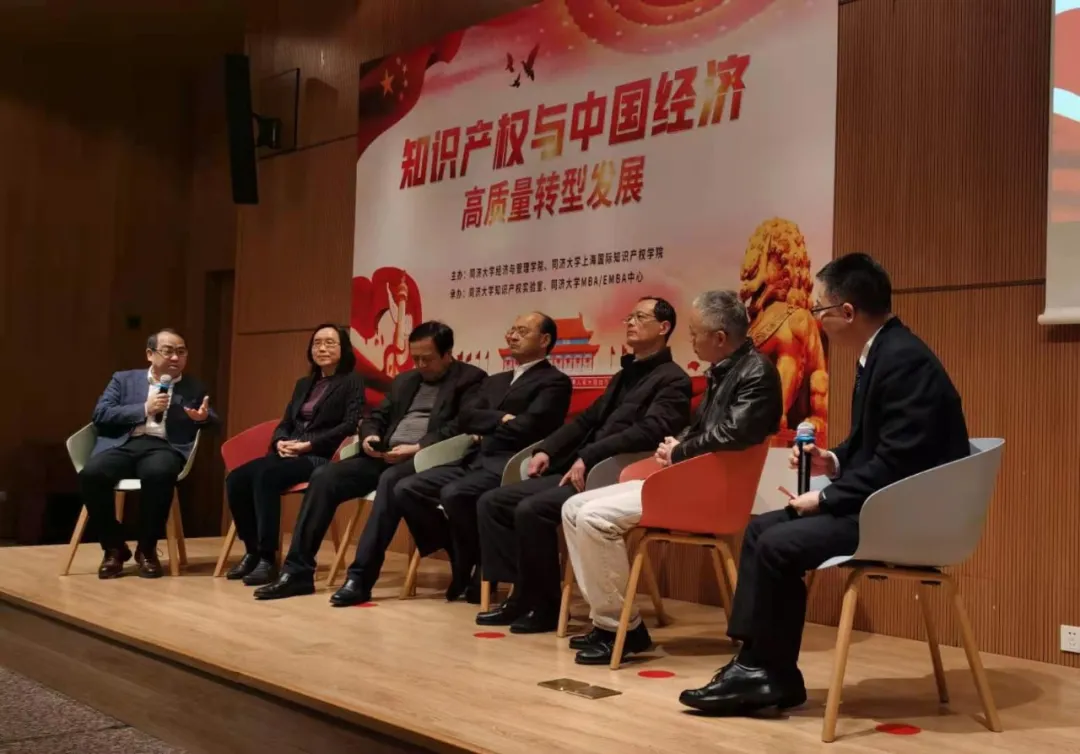
In the roundtable session, moderator Xu Chunming raised two questions: one is the role and impact of the policy, and the other is how to evaluate the value of intellectual property rights. Mr. Shan Xiaoguang expressed his view that it is difficult to assess the pricing of IPRs in terms of prices or figures, and that IPRs themselves are more of a capacity nature and therefore cannot be measured in terms of pricing, but rather as a transfer of capacity. It is a process of transfer of capacity and continuous fee. Mr. Chen Qiang said that IPR is actually an effective way for market integration, where disciplines, knowledge spillover and market demand interact closely and finally converge into IPR protection work. Under the strong regulatory power of the government, the value of IPR still has to be reflected through the market. Mr. Lv Guoqiang emphasized the importance of the quality of IPRs, and that the current phase of IPR work should focus on the improvement of quality rather than the growth of quantity. Mr. Han Xiucheng expressed his views on abnormal patent applications, pointing out that the direction of the national policy is correct and obvious, and that the generation of abnormal high-value patents should be avoided as far as possible in practice, and that under the regulation of the national policy, provinces and cities should unify their standards to avoid the phenomenon of inconsistent IPR evaluation standards. In this regard, Mr. Mu Rongping added that the goal of all policies is to encourage the improvement of innovation capacity under IPR incentives, rather than for the purpose of evaluation or pricing. Finally, Ms. Long Xiaoning suggested from the perspective of regulating economics that there are unintended consequences of any regulation and policy, and the directionality of policy issuance often deviates in the process of implementation, but such IP-related deviations that are difficult to give accurate valuation often exist more difficult to work with. Therefore, we need a batch of typical IP cases to calculate the high-value patent compensation as accurately as possible to ensure the policy implementation.
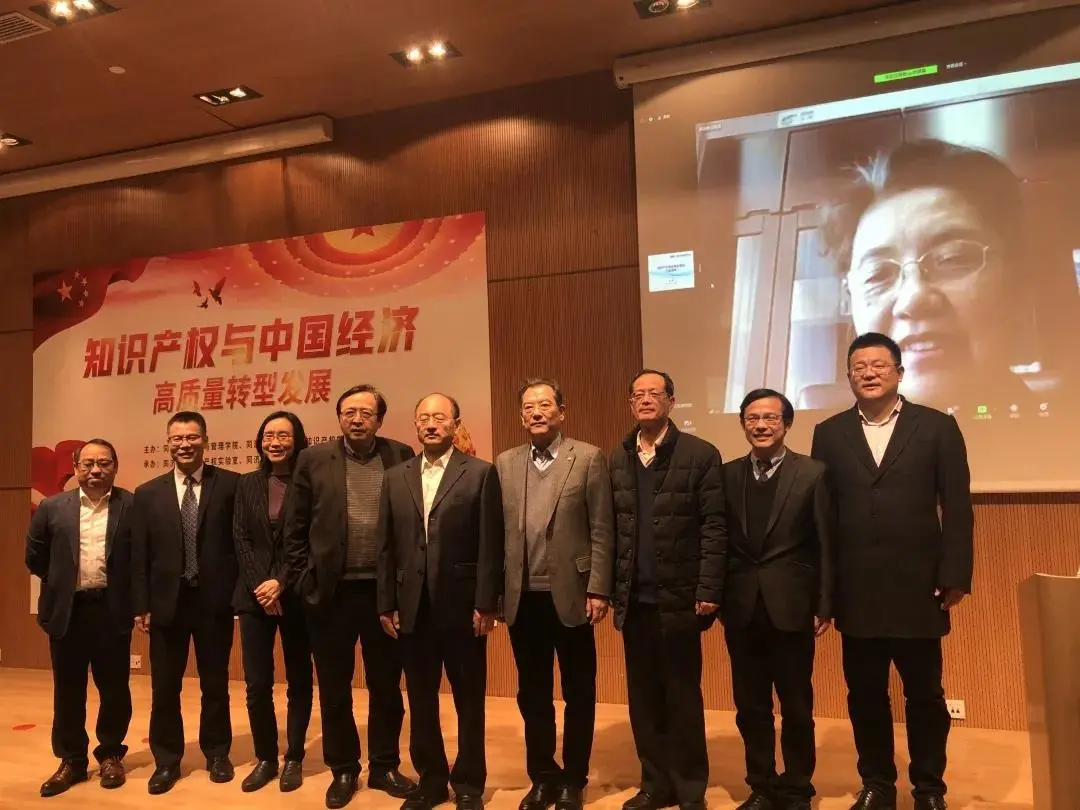
This forum is co-organized by the School of Economics and Management of Tongji University and the Shanghai International College of Intellectual Property. With the mission of building a top intellectual property discipline oriented to sustainable development, the Shanghai International Intellectual Property Institute of Tongji University adheres to the advantages of diversification and internationalization of intellectual property disciplines, actively builds a world-class international high-end intellectual property talent training base and an intellectual property research think tank with global influence, and serves national major strategies such as the national intellectual property power strategy and the construction of Shanghai as a global science and innovation center. The School of Economics and Management of Tongji University takes the mission of creating new knowledge of management, creating elites in the industry, practicing sustainable development, and addressing global challenges, and closely integrates teaching and research work from the actual needs of discipline construction and economic construction, with scientific research as an important part of the development of the School and internationalization as a development feature, to reserve high-level research scholars for the high-quality transformation and development of China's economy.
Tongji University is looking forward to working with experts from academia and industry to provide more powerful research support and talent guarantee for China's high-quality economic transformation and comprehensive construction of a modern socialist country.






 0086-021-65983113
0086-021-65983113  sicip_intoff@tongji.edu.cn
sicip_intoff@tongji.edu.cn